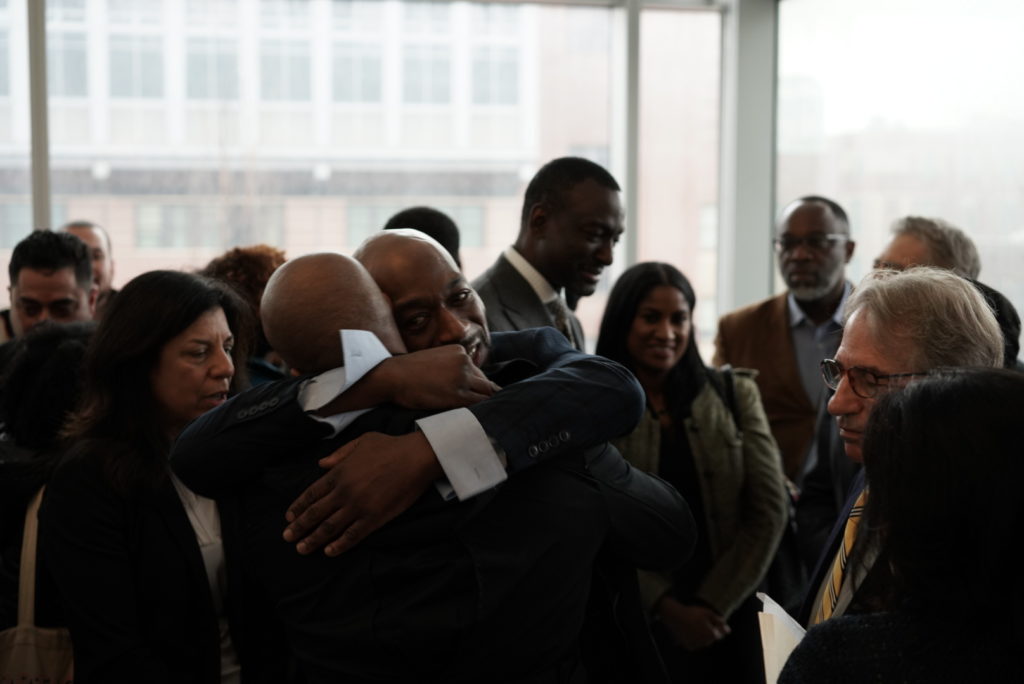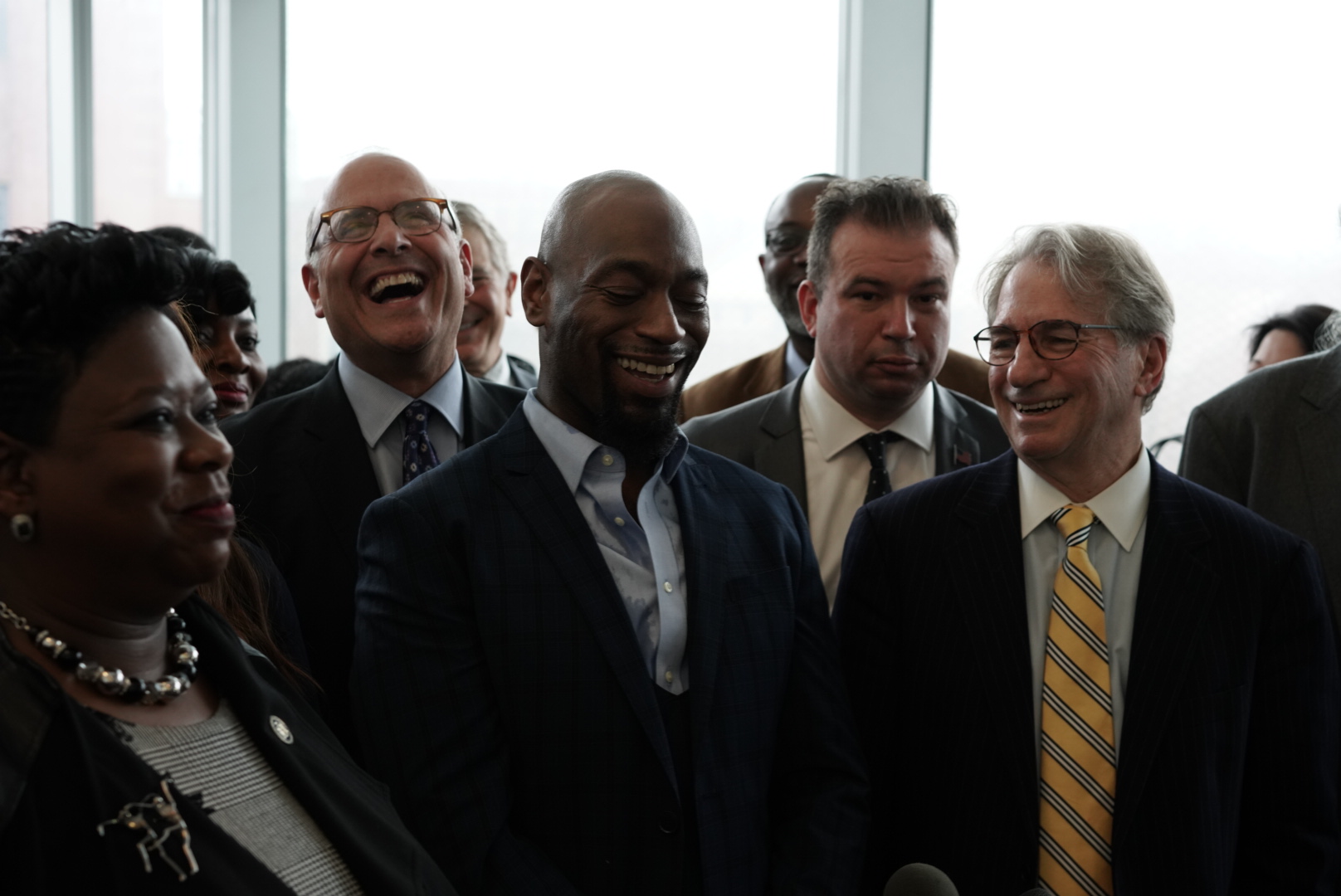Bronx Man’s 1991 Murder Conviction Vacated
01.24.19 By Innocence Staff
Investigation Reveals Innocent Man was Wrongfully Convicted after Career Detectives Used Flawed Interrogation Techniques that Produced Unreliable and False Confessions
(Bronx, NY- January 24, 2019) Today, Bronx Supreme Court Justice Steven Barrett vacated the 1991 murder conviction of Huwe Burton. Justice Barrett based his decision on findings by the Bronx District Attorney’s Conviction Integrity Unit (CIU) that detectives from the 47th precinct had coerced Burton into falsely confessing to murdering his mother when he was just 16 years old.
Burton’s legal team includes Susan Friedman and Barry Scheck of the Innocence Project; Steven Drizin of Northwestern Pritzker School of Law’s Center on Wrongful Convictions; and Laura Cohen of Rutgers Law School’s Criminal and Youth Justice Clinic.
Watch: hearing live below
Burton’s legal team and the Bronx CIU jointly conducted an exhaustive two-year re-investigation that uncovered newly discovered evidence, including: (1) scientific and scholarly research confirming that the psychologically coercive techniques used by the detectives produce false confessions; (2) the same detectives who elicited Burton’s false confession also obtained false confessions from two other individuals three months earlier; and (3) the background and prior criminal history of the alternate suspect, Emanuel Green, that strongly supports the defense team’s contention that Green committed the crime alone.
Based on these findings, the Bronx CIU recommended that Burton’s conviction be vacated and the charges be dismissed.
“Huwe Burton is an extraordinary individual. The injustice he endured is unimaginable—to be wrongly convicted of murdering his mother, whom he adored. Today, Mr. Burton will finally get some measure of justice. The defense team is extremely grateful to District Attorney Clark and the Bronx CIU for their extraordinary work. We hope this tragic case can serve as a learning moment about the value of new scientific research on false confessions and steps that can be taken to avoid dangerously coercive interrogation techniques,” said Innocence Project Attorney Susan Friedman. “Based on the three false confessions revealed during this investigation, we also hope and expect that the CIU is open to reviewing other cases handled by these detectives if the parties can develop a mechanism to identify them.”
In the early evening hours of January 3, 1989, Burton came home to discover his mother Keziah Burton stabbed to death. Burton, who had been in school during the day, had no criminal history and a close-knit relationship with his parents and extended family.
Burton’s conviction was based largely on a confession he made to three detectives—Frank Viggiano, Stanley Schiffman and Sevelie Jones—from the 47th Precinct who used psychologically coercive techniques that were standard practice at the time. The techniques included isolating Burton from his father, threatening him with additional criminal charges and, ultimately, offering leniency if he confessed to killing his mother. Sleep deprived and traumatized by his mother’s death, Burton provided a written and recorded statement that he’d accidentally stabbed his mother during an argument when she would not give him money to pay a debt to a drug dealer. He told detectives that he left the key to the family car on the floorboard after the murder and the drug dealer took it. The car was missing when her body was found. Burton immediately recanted his confession.
Watch: press conference below
The conviction was also based on false statements from Emanuel Green who was renting a downstairs apartment from the Burton family. Five days after detectives obtained Burton’s confession, Green was arrested by the police. He was driving Keziah Burton’s car, which had been stolen the day of the murder.
The same detectives who obtained Burton’s false confession questioned Green. They secured written and videotaped statements from him claiming that Burton asked Green for help after stabbing his mother and Green complied (saying his “criminal mind” took over) by staging the crime scene to look like a rape and robbery, telling Burton to dispose of the murder weapon, and promising to sell the family car and split the profits. Green was killed in a lover’s triangle incident before Burton’s trial and never testified.
At trial, Burton maintained his innocence, testifying that the officers coerced his false confession and argued that Green was, in fact, the man who killed his mother. His defense attorney, William Kunstler, attempted to call an expert to testify on the unreliability of Burton’s confession, but to no avail; the court denied his request.
Burton was wrongfully convicted and spent 19 years in prison for a crime he did not commit before he was released on parole in 2009.
Over the course what is nearly 30 years since Burton was arrested, a substantial body of scientific and scholarly research has been conducted identifying dispositional and situational “risk factors” that can produce false confessions, including youth and bereavement (dispositional factors) and commonly used interrogation tactics that are psychologically coercive (situational factors). After taking a hard look at Burton’s confession during the joint re-investigation with the assistance of experts, the Bronx CIU recognized the false confession research was itself “newly discovered evidence” that, when applied to the facts of the Burton case, required a finding that Burton’s confession was false and unreliable, a product of a psychologically coercive interrogation techniques used by the detectives. Burton’s defense team believes this newly discovered evidence finding is unique and extremely important to the future litigation of false confession cases.
The re-investigation also revealed that three of the detectives from the 47th precinct who interrogated Burton—Frank Viggiano, Stanley Schiffman, and Sevelie Jones—used the same psychologically coercive interrogation tactics to obtain false confessions from two other individuals, Dennis Coss and Kelvin Parker, just three months before Burton. Coss and Parker confessed to being look-outs and getaway drivers for a man named Amonte, whom the detectives believed had committed a robbery murder inside a grocery store. Soon after the confessions, it was discovered that Amonte was in jail the day of the murder. Nonetheless, Coss and Parker were tried for murder. They both testified the detectives “fed” them a story about being lookouts for Amonte, had them use specific words, carefully rehearsed the statements and assured them they would be rewarded for their co-operation, that as lookouts they were not responsible for the homicides, and they would be able to see their families as soon as their confessions were complete. After awaiting two years to be tried, Coss and Parker were acquitted in less than an hour.

Huwe Burton hugging a family member following his exoneration. Photo by Sameer Abdel-Khalek.
Significantly, the Bronx CIU found that “even assuming that the police acted above board in every respect and did not knowingly engage in coercive tactics, the false statements that they obtained independently from Coss and Parker establish that, at the time Burton confessed, the detectives were using techniques that produced false statements.”
Finally, the joint re-investigation produced new information about Emanuel Green’s criminal history that strongly supported Burton’s defense that Green had murdered Keziah Burton. Green had two prior convictions—one for an attempted knife-point robbery and a second for a violent rape of an acquaintance. Police reports in the rape case showed he repeatedly lied to investigators and changed his story in a way similar to how he lied in the Burton investigation. A psychologist who evaluated Green determined he had a “schizoid personality disorder of adolescence, with depressive and aggressive trends, and underlying trends toward explosiveness.”
Huwe Burton’s father, Raphael Burton, was in Jamaica visiting family on the day his wife was murdered. Burton’s father spent his life savings on his son’s defense, however he passed away prior to Burton’s release from prison.
Bronx District Attorney Darcel D. Clark said, “Mr. Burton served 19 years in prison and since his release in 2009 has led a law-abiding life. He has maintained his innocence for almost 30 years and now we will clear his name of this brutal killing. The interests of the community are best served by dismissing this indictment so he can move on with the rest of his life.”
Leave a Reply
Thank you for visiting us. You can learn more about how we consider cases here. Please avoid sharing any personal information in the comments below and join us in making this a hate-speech free and safe space for everyone.
June 28, 2021 at 10:28 pm
February 15, 2021 at 11:22 am
Incredible story


My mom was murdered in 1989 and the case is still open. I still would rather a million guilty men go free than convict one innocent man.